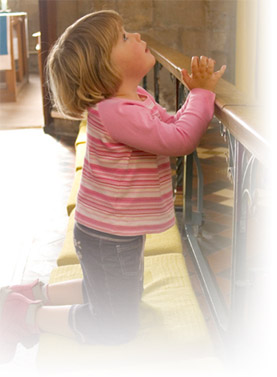Sunday Sermon for July 1, 2018, the Thirteenth Sunday in Ordinary Time, Year B
Readings: Wis 1:13-15, 2:23-24; 2 Cor 8:7, 9, 13-15; Mk 5:21-43
In the first reading today we hear from the Book of Wisdom that God formed us to be imperishable in the image of His own nature. However, Wisdom goes on to say, death came into the world through the envy of the devil.
Being made in the image of God’s own nature tells us several things: we are persons, not objects; we have a mind and a free will; we have not only natural life, but we were created immortal. We need to make a clear distinction between immortality and the death that came into the world through the envy of the devil.
Our souls are immortal; they can never die. Death is the separation of the soul from the body. So the soul, the principle of life in us, leaves the body and the person dies. However, the soul continues to live because it is not capable of dying.
The natural life of the soul gives life to the body, but cannot bring the soul to eternal life. The human person is made in the image of God’s own nature, so we are made for life beyond this earth. Adam and Eve (and their descendents) were not supposed to die; God created them to live and never die. We do not know how their end on earth was to take place, but I assume it was similar to what happened to Enoch whom Scripture simply says God took him. It has always been understood that he did not die.
Unfortunately, our first parents fell prey to the lies of the vile creature and embraced death rather than clinging to life. Adam and Eve were created with Sanctifying Grace, the life of God. This gift was lost when they sinned. After their disobedience, their souls were still immortal, but they no longer had the ability to enter into eternity.
Having seen already that we were made in the image of the nature of God, it is all the more remarkable that the second Person of the Trinity, though He was rich, as St. Paul says in the second reading, became poor for our sake, so that by His poverty we might become rich. God, Who created us in the image of His nature, came into this world and took a human nature to Himself. This is His poverty.
He did not become the image of our nature; He took our nature and united it with His own. In baptism we are incorporated into Christ and, as St. Peter tells us, we become partakers of the divine nature. So, by creation we are made in the image of the divine nature, but this is still poverty in comparison to God Himself. So, our Lord, in His love and mercy, chose to make us rich, that is, He raised us up and gave us a share in His own nature.
In the Gospel we hear about the raising of the daughter of Jairus and the healing of the woman with a hemorrhage. In the latter we are told Jesus was aware that power had gone out from Him. In the former, our Lord gently takes the hand of the girl and commands her to rise. The same power that healed the woman now raises the dead.
We marvel, and rightly so, at such miracles. But these are nothing compared to the miracle that has taken place in each of us. It is wonderful that the woman was healed of her flow of blood and the little girl could carry on with her life. Both of these miracles, however, simply restore what is natural.
What Jesus has done for us is supernatural. The “natural” condition of Adam and Eve at the time of their creation included grace, which is supernatural, but at the time, they had no other experience other than being united to God through grace. But Jesus did not merely restore us to this life, including grace, enjoyed by our first parents. He changed us and made us partakers in His divine nature and life.
So often people pray for healing of some ailment or another, but the greater healing we need is to know and accept our dignity in order to act according to that dignity. Some of the effects of Original Sin, especially the darkening of the mind and the weakening of the will, make it difficult for us to accept our dignity. Jesus did not remove all the effects of Original Sin, but He has destroyed the effects of the devil’s envy (death) and raised us beyond what our first parents had; therefore, we need to learn to focus, not on the natural, but on the supernatural life which makes us partakers of God’s life now and brings us into eternal life in Heaven.
Fr. Altier’s column appears regularly in The Wanderer, a national Catholic weekly published in St. Paul, Minn. For information about subscribing to The Wanderer, please visit www.thewandererpress.com.

